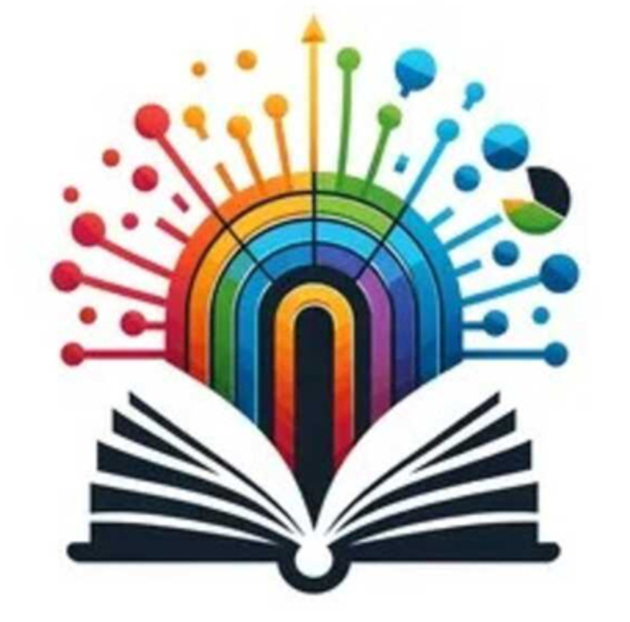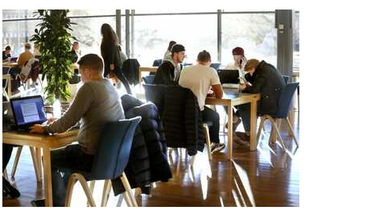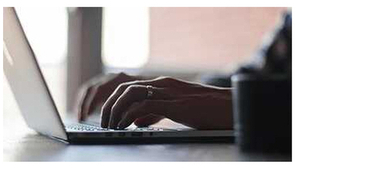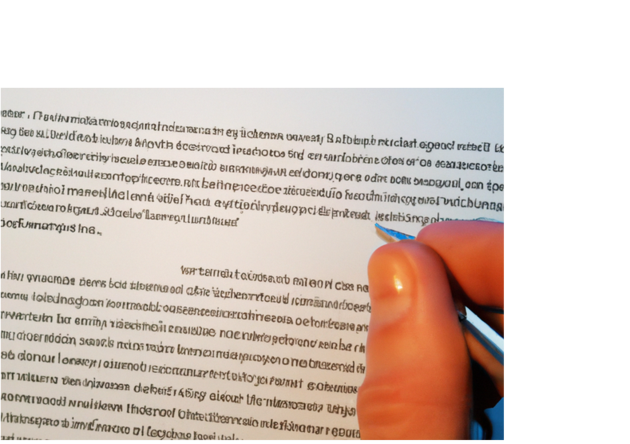|
|
Autumn is here, and it's wonderful that we have a new academic year ahead of us!
Seeing the university transform from the dormancy of summer - with its empty corridors and deserted lecture halls - into a vibrant, colourful arena of knowledge and creativity is always a source of joy, in my opinion.
We know that the physical library today is mostly used by undergraduate students. But everyone is welcome here. So if you, as a researcher, ever feel tired of your office, feel free to bring your laptop or book and come sit with us for a while - either to soak in the buzz of activity or to enjoy a quiet moment in one of our silent reading rooms.
For those of us working in the library’s research and publishing support, this autumn will be very much about new technology. We’re continuously testing new AI tools, several new search interfaces for our information databases have been introduced, and we’re beginning preparations for a major upgrade of our publication database, DiVA.
Speaking of new technology, we’re very happy to welcome Kristian Niemi, senior lecturer and head of subject for Religious Studies at KAU, to the library. Kristian will be working with us one day a week to further develop the bibliometric tool Bifrost, which he programmed using his R coding skills. Read more about that - and much more - below.
|
|
|
|
|
|
|
|
|
Since a couple of years, we have offered automatic speech-to-text transcription through Amberscript (SUNET Speech-to-text). As of 1 January 2026, the agreement with Amberscript will be terminated, but we will offer you a new service instead.
If you currently use Amberscript, please bear in mind the following:
- Remove any existing data on the platform before 1 January. Please note that any data you delete from the account cannot be restored. Therefore, make sure to save your completed transcriptions on your KAU computer or in Sunet Drive.
- You will be able to use Amberscript as normal through 31 December, 2025.
Information on the new transcription service will be provided as soon as possible by email to all current Amberscript account holders at KAU, through this newsletter and on our webpages.
Back to top
|
|
|
|
|
|
|
 |
|
The library has activated trial access to a couple of AI tools designed to enhance the search experience through natural language and intelligent subject exploration. You can access these tools directly within the Scopus and Web of Science databases. The trial period runs until 10 October. We welcome your feedback on the tools (see links below)!
Back to top
|
|
|
|
 |
|
The Swedish Research Council has now launched a forum to coordinate the transition to open access to research data and to promote collaboration around secure and reliable FAIR data management.
The forum will serve as a meeting place for researchers and other stakeholders to discuss and share experiences on issues concerning open data.
To join the forum, login with your KAU credentials at SUNET Forum.
Back to top
|
|
|
|
|
|
|
|

|
|
This August, Kristian Niemi senior lecturer and head of subject for Religious Studies, began working part-time at the university library, where he will be developing the bibliometric tool Bifrost. We had a brief chat with him about the project.
Kristian, a warm welcome to the library! To start off - what inspired you to create Bifrost?
Thank you, it's great to be here! The idea came from a research question regarding compilation theses. The hypothesis was that they had grown in number, particularly in the social sciences and humanities, but I lacked data to confirm or refute the statement. As I wanted data for a long period of time (decades) as well as a broad range of subjects (all of them!), a multitude of different data searches through DiVA and manually copying each result to Excel was too prone to human error. As I know some programming, I started coding in R. The result is published in an article from 2023. During a later postdoc-period, I had a different research need: to map a specific research field; religious education didactics. I continued programming, and soon Bifrost saw the light of day. (The Bifrost analysis of the RE field can be found here.)
What’s your main goal with Bifrost?
Systematic bibliometric analysis of Swedish research. I want to build a user-friendly tool that enables fast and efficient analyses of research publications. It should present results in a visually appealing way, accessible regardless of the user's specific needs or background.
Who do you think could benefit from using Bifrost?
In short, anyone interested in gaining an overview of research activity — whether it's for research topics, individuals or groups, research centres, academic disciplines, or even for cross-university comparisons. Since Bifrost uses DiVA and Swepub as its underlying databases, it’s particularly useful for analysing research output from Swedish universities. For research fields like the social sciences and the humanities, that are not well indexed by the international databases such as Web of Science or Scopus, considering Swepub is essential. Up until now, there has not been a tool suited for that particular task.
If a researcher wants to try out Bifrost, what should they do?
You can see some examples of what Bifrost produces at the library website. For custom analyses of your particular interest, just reach out to me at kristian.niemi@kau.se! I’d be happy to provide more information and help you get started.
|
|
|
|
|
|
|
|
 |
|
The University Library offers a 3-credit course for PhD students who want to strengthen their skills in information searching, publishing strategies, open access, and copyright.
The course is aimed at doctoral students in the early stages of their studies and is held on campus.
The next round of the course runs in spring 2026.
Last day to apply: 7 January 2026
More information: Course webpage
Questions? Contact: forskarstod@kau.se
Back to top
|
|
|
|
 |
|
If you are a PhD student or supervisor, you are probably aware that all PhD courses at KAU can be found at Doktorandkurstorget.
To help you find the general courses suitable for students of all subject areas within this large collection, we have listed them here: General Doctoral Courses
Back to top
|
|
|
|
|
|
|
|

|
|
Do you and your colleagues in your subject area or department hold internal seminars to discuss current research funding applications? If so, would you consider inviting a librarian to join?
As you know, librarians are experts in areas such as information retrieval, scholarly publishing, and copyright. When you are planning to discuss upcoming applications, we would be happy to attend, listen in, and—if needed—offer advice on suitable databases, search strategies, open access funding, data publishing, copyright and research visibility. Feel free to put us to the test by inviting us.
If you’re interested, please contact us at publiceringsstod@kau.se.
Back to top
|
|
|
|
|
|
|
|

|
|
We at the library’s publishing support team try our best to provide support to you on copyright issues. From time to time, we and the university’s legal office get questions on different clauses used by publishers in their publishing agreements. But to be able to improve our support to you, we would benefit from more agreement examples, and for this reason we kindly ask for your help.
If you have recently received a publishing agreement - whether for a journal article, book chapter, or other academic work from any Swedish or international publisher - we would greatly appreciate it if you could share a copy with us. These documents will be used solely for internal analysis to identify common clauses, variations in publisher policies, and potential areas of concern or improvement. No personal data or confidential information will be disclosed or published.
Your contribution will help us build a more comprehensive picture of the current publishing landscape and support future efforts to promote transparency and fairness in academic publishing.
Please send your agreement(s) to publiceringsstod@kau.se.
Thank you for your help!
Back to top
|
|
|
|
|
|
|
|

|
|
This year's International Open Access Week theme is 'Who Owns Our Knowledge'.
We at the library will celebrate the week by a series of activities on the KAU Instagram account Kauresearch. So tune in to Instagram between 20-24 October to learn about the more and more pressing issue of ownership over research outputs.
(Spoiler alert: Our take-home message will be: Do not give away your rights to your own research!)
Back to top
|
|
|
|
|
|
|
|
On 7 October, between 11.00-12.00 the Swedish National Data Service (SND) arranges a webinar called Synthetic data, bias, and metadata for transparency. The webinar is aimed at researchers and will be led by Professor Ericka Johnson (Linköping University).
Click here for more information →
Back to top
|
|
|
|
|
|
Even before the advancements in generative AI, the quality of the peer review process was widely discussed. Some publishers were criticised for not allowing reviewers enough time to conduct proper reviews, and papers have been retracted due to malpractice that was not identified during peer review. AI has added to these challenges, although some also hope it can help filter out poor-quality research from the ever-increasing number of journal submissions.
To ensure that peer review genuinely reflects quality, Ashotosh Ghildiyal of Integra, and Gareth Dyke of 4Evolution and Sci-Train, propose a peer review quality rating system. Criteria included in the system includes reviewer accountability, AI disclosure, integrity protocols, and more.
Read more about their proposed system here.
Back to top
|
|
|
|
|
|